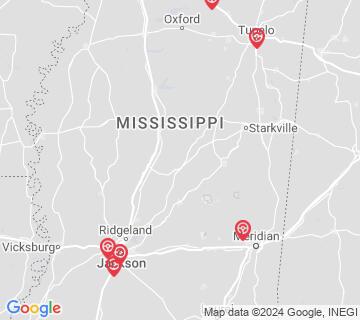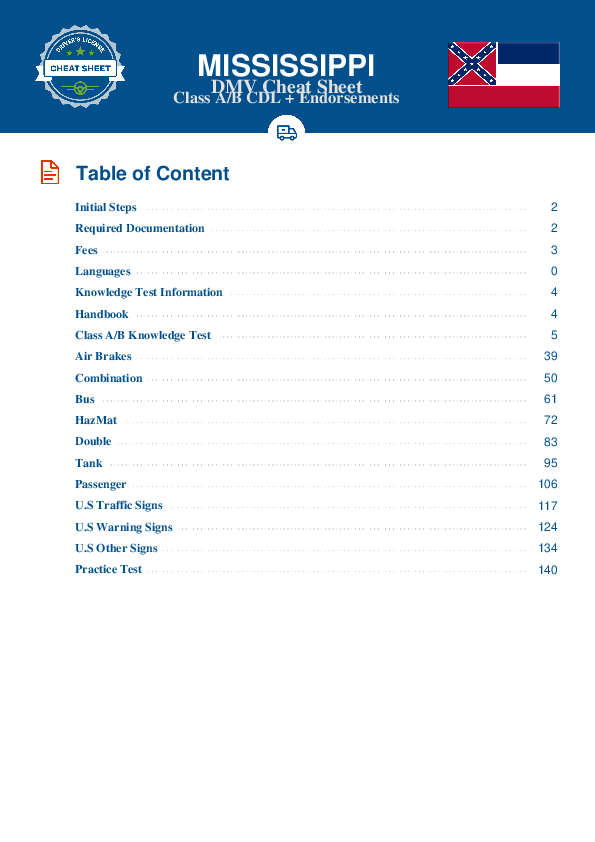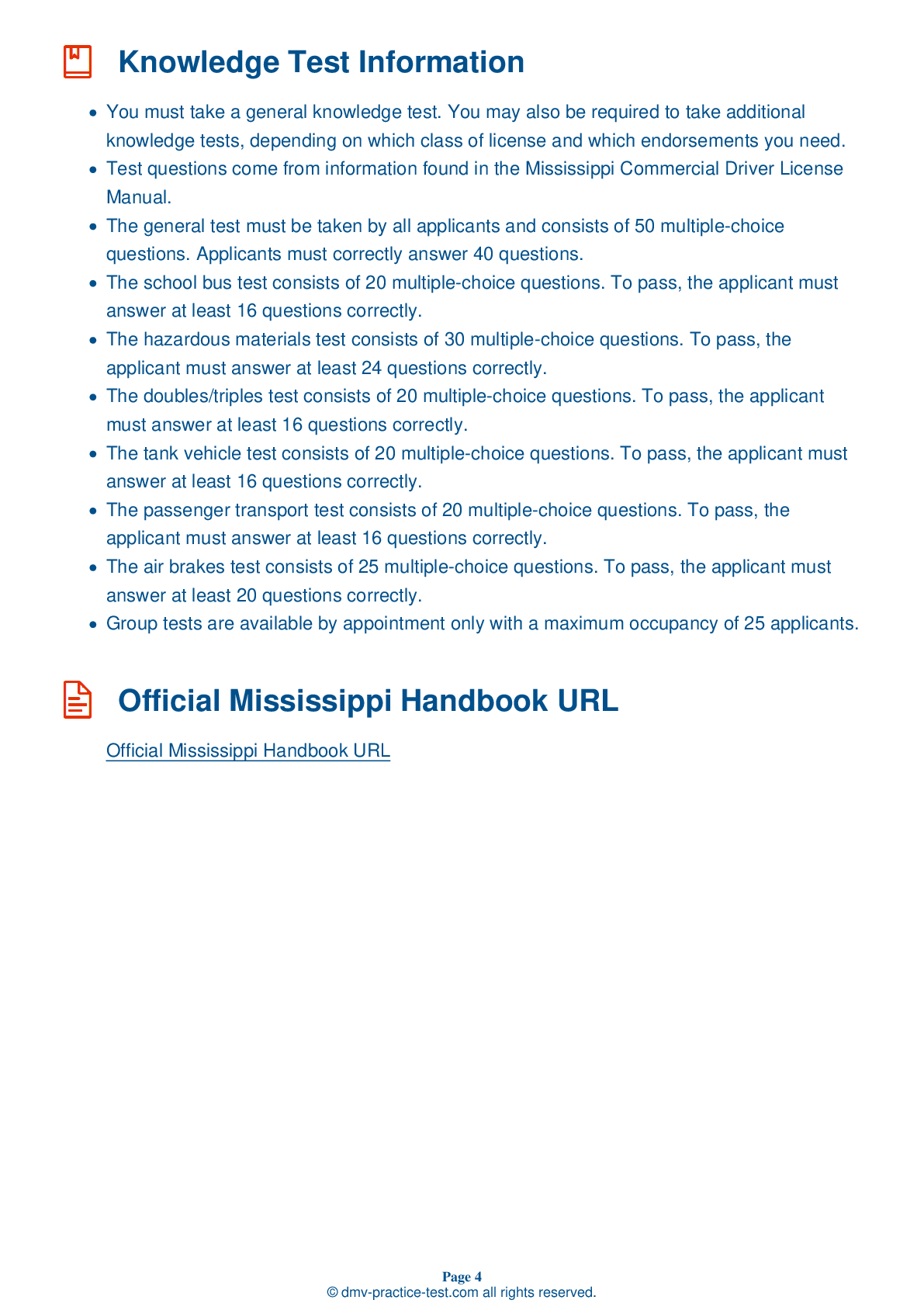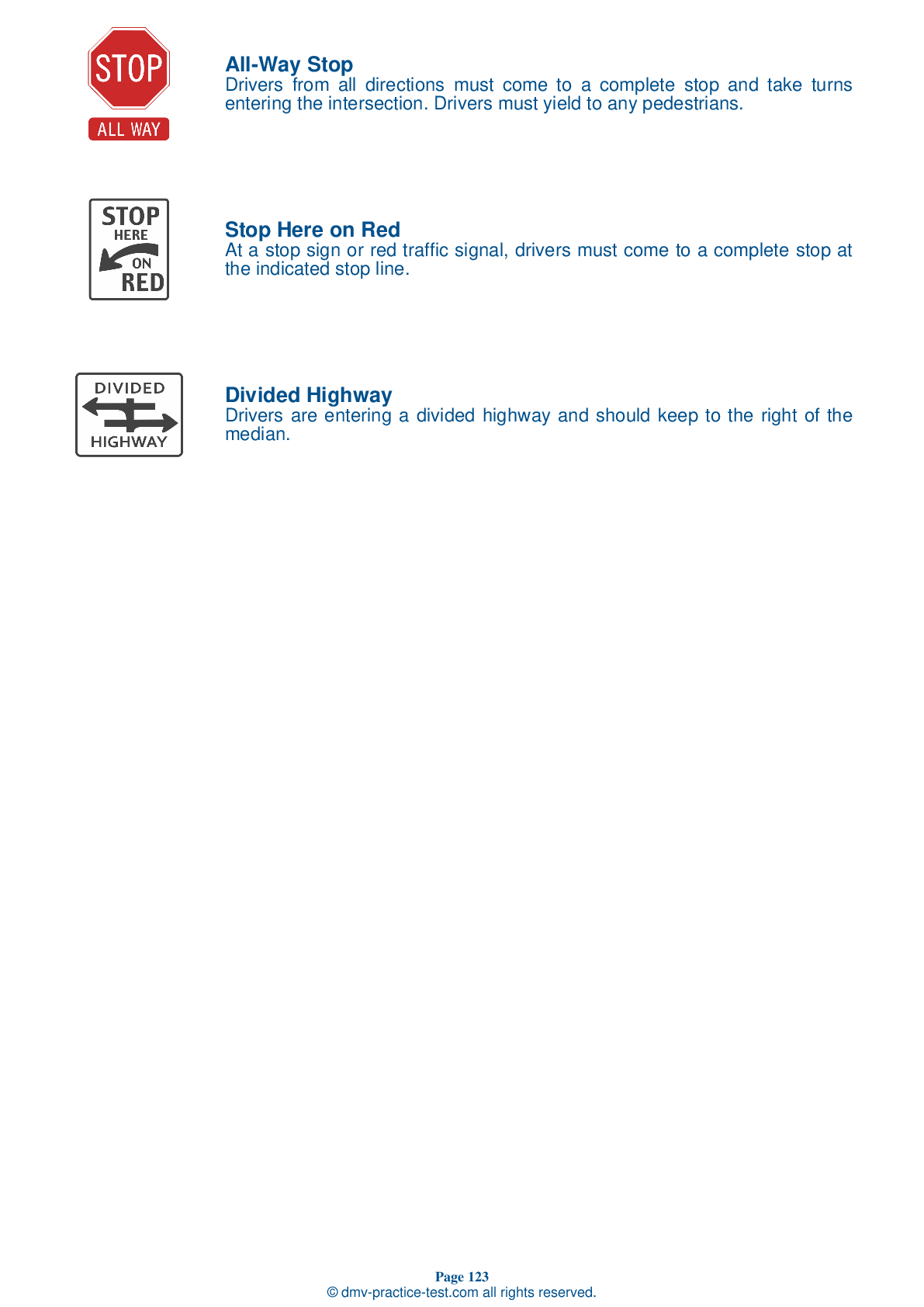Knowledge Test Class B #2
Class B Driving Test | Mississippi 2026 #2
Train for FREE online with our Mississippi class B license test. The official exam test consists of several obligatory parts, with all of them checking your knowledge of different blocks of road rules. If you need to obtain a MS CDL class B permit in 2026, practice as much as possible. Free sample tests published on our website will help you check and improve your knowledge and boost your grades. Please bear in mind that CDL class B requirements may vary from state to state.
50
40
20
1 . When a construction worker is close to the road, you should:
Wait to proceed until the construction is complete.
In construction zones, do not exceed the posted safe sped limit. Slow down even more when workers are near the roadway.
2 . While driving, if you notice anything affecting safety or mechanics, you should:
Not use that part of the vehicle and hope others don't notice the problem.
At the end of each day of driving, you may be required to make a written report on the vehicle or vehicles driven. Be sure to make note of any issues that could affect the safety of the vehicle or that could lead to a mechanical breakdown.
3 . In a vehicle with dual air brakes, a leak in one system ____ the second system.
A dual air brake system is made up of two separate air brake systems. If there is an air leak in one system, it may not affect the other.
4 . In a newer vehicle, you apply the parking brake:
By using a black round knob.
In a newer vehicle with air brakes, the parking brake is controlled by a diamond-shaped yellow knob. The knob is pulled out to apply the parking brakes and pushed in to release them.
5 . Of the following, which is the most slippery surface?
Ice becomes wet when the weather is just warm enough to melt the ice slightly. Wet ice is much more slippery than ice that is not wet.
6 . When conducting a vehicle inspection, you will need to identify all of the following, except:
The water compressor belt.
During the vehicle inspection test, you must check the power steering belt, water pump belt, alternator belt, and air compressor belt for snugness, cracks, or frays. If any of these components are not belt-driven, you must tell the examiner which one(s), and verify that they are operating properly, mounted securely, and not damaged or leaking.
7 . Why should the steps of a pre-trip inspection be done in the same order each time?
Pre-trip inspections should be conducted in the same way every time. This will reinforce the steps, making it less likely that you will forget to inspect something important.
Search the best driving school in your neighbourhood
2026 Mississippi | Frequently Asked Questions
A CDL Class A license in Mississippi allows the holder to operate any combination of vehicles with a Gross Combination Weight Rating (GCWR) of 26,001 pounds or more, provided the Gross Vehicle Weight Rating (GVWR) of the vehicle(s) being towed is over 10,000 pounds. This typically includes tractor-trailer combinations.
A Class A CDL license in Mississippi permits the operation of vehicles such as tractor-trailers, truck and trailer combinations, tank vehicles, livestock carriers, and flatbeds. Basically, it covers any combination of vehicles with a gross combination weight rating (GCWR) of 26,001 pounds or more if the towed vehicle is over 10,000 pounds.
To obtain a Class A CDL in Mississippi, you must be at least 21 years old (18 for intrastate travel), possess a valid Mississippi driver's license, pass a vision test, and complete a written knowledge exam. You'll also need to pass skills tests in a vehicle representative of the class you're applying for, and meet medical requirements.
In Mississippi, you must be at least 21 years old to qualify for a Class A CDL license for interstate driving. However, you can be 18 years old to apply for a CDL for intrastate driving, which limits you to driving within the state of Mississippi only.
Endorsements aren't required for a Class A CDL license, however, they can enhance your license. They allow you to drive specific types of vehicles like tank vehicles, passenger vehicles, school buses or transport hazardous materials. To get an endorsement, you must pass additional written and skills tests related to the specific type of vehicle.
The Class A CDL skills test in Mississippi encompasses three sections: a pre-trip vehicle inspection, a basic vehicle control test, and an on-road driving test. These tests evaluate your ability to inspect your vehicle before the trip, control the vehicle during typical maneuvers, and drive safely in various road and traffic conditions.
Yes, there are limitations. Class A CDL license holders in Mississippi may be restricted based on the type of vehicle they tested in. For instance, if the test was taken in an automatic vehicle, they can't drive a manual truck. Other limitations could be related to air brakes, passengers, tank vehicles, and hazardous materials.
In Mississippi, the written Class A CDL test is generally conducted in English. However, some states may offer the test in Spanish. Non-English speakers can usually use a dictionary or bring an interpreter. It's important to check with the local DMV office for specific language accommodations. Remember, federal regulations require all CDL holders to read and speak English.
Yes, you can request accommodations for the Class A CDL written test if you have a disability. Mississippi's Department of Public Safety works to ensure accessibility for all test-takers. Accommodations may include extra time, a separate testing room, or assistive technology. You should contact your local testing center in advance to discuss your needs and arrange accommodations.
Yes, if you don't pass the Class A CDL written test in Mississippi, you can retake it. However, you may have to wait a specified period before you can reattempt it. It's also likely that you'll have to pay a retesting fee. Check with the Mississippi Department of Public Safety for specific rules and regulations regarding retakes.




